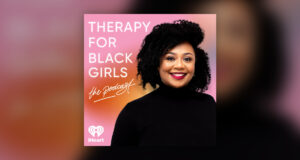
Rachel Star Withers creates videos documenting her schizophrenia, ways to manage and let others like her know they are not alone and can still live an amazing life. She has written Lil Broken Star: Understanding Schizophrenia for Kids and a tool for schizophrenics, To See in the Dark: Hallucination and Delusion Journal. Fun Fact: She has wrestled alligators.
Rachel grew up seeing monsters, hearing people in the walls, and having intense urges to hurt herself. She creates videos documenting her schizophrenia and ways to manage and let others like her know they are not alone and can still live an amazing life.

Our host, Gabe Howard, is an award-winning writer and speaker who lives with bipolar disorder. He is the author of the popular book, “Mental Illness is an Asshole and other Observations,” available from Amazon; signed copies are also available directly from the author.
Gabe makes his home in the suburbs of Columbus, Ohio. He lives with his supportive wife, Kendall, and a Miniature Schnauzer dog that he never wanted, but now can’t imagine life without.
To book Gabe for your next event or learn more about him, please visit gabehoward.com.
Producer’s Note: Please be mindful that this transcript has been computer generated and therefore may contain inaccuracies and grammar errors. Thank you.
Announcer: You’re listening to Inside Mental Health: A Psych Central Podcast where experts share experiences and the latest thinking on mental health and psychology. Here’s your host, Gabe Howard.
Gabe Howard: Welcome to the show, everyone. I’m your host Gabe Howard. Calling into the show today, we have Rachel Star Withers. Rachel is an entertainer, international speaker, video producer, and a person who lives with schizophrenia. She has appeared on MTV’s Ridiculousness, Marvel’s Black Panther, Tubi’s Shockfight, and is the host of our very own Healthline Media podcast, Inside Schizophrenia. Rachel, welcome to the podcast.
Rachel Star Withers: Thank you so much for having me, Gabe.
Gabe Howard: Well, as you know, you and I work together over on Inside Schizophrenia where you share your lived experience and also, well, you know, medical facts and you interview other people who live with schizophrenia and you interview caregivers about, you know, taking care of people who live with schizophrenia and family members and friends and support. You do a lot for schizophrenia advocacy. I, I bow to you.
Rachel Star Withers: Well, thank you so much, Gabe. And obviously you do quite a bit with the show too. Thank you. And if you’re listening out there and you haven’t checked out Inside Schizophrenia, even if you don’t have schizophrenia, it’s a very interesting show. I think it’s great for anyone who is interested in psychology in general. I have a lot of med students who contact us, and so many of them are like, hey, I never knew this side of medicine was even going on, like all of this stuff. So please check it out if you haven’t. And Gabe, we get into some crazy topics. I mean, serial killers, mass shooters. We talk about lobotomies. So it’s not just like this fluffy caregivers taking care of us. Poor little people with schizophrenia. Like we hit on all the topics recently. We even talked about institutionalization.
Gabe Howard: Yeah, we hit on everything. And, you know, I say we because I just want to feel like I’m involved. But, Rachel, you’re the driving force behind this. You’re really creating a new narrative for what it means to live with schizophrenia. And that’s why I wanted to invite you on the show today. Because we tell stories on Inside Mental Health all the time. People who have overcome addiction, mental illness, people who have overcome all kinds of things. And we have our own Rachel, who has overcome so much and of course is a thought leader in the process. I want to go all the way back to the beginning. Like day one. How did you find out that you had schizophrenia?
Rachel Star Withers: So super cool. I grew up in the South, and when I say South, I mean the hardcore Bible Belt. South Carolina, and growing up, I had what I would later learn were hallucinations. I would see faces and things. I would hear things in the wall, and it was always like there was a radio left on or TV and like another room of the house. So it was kind of like this gibberish. I can’t tell you what the people were saying, but I always heard gibberish going on. Because I grew up in the church. I thought, oh, demons. And that’s what, you know, you go to church three times a week and that’s what the pastor’s always talking about is angels and demons and Satan and God. So common sense, that’s what he was talking about. So that’s what I grew up just assuming that that’s what that was. And it wasn’t until I was 17 years old that I was like talking to one of my friends, and they were like, Rachel, what in the world are you talking about? And that was the moment I realized, oh, other people don’t see all these things.
Gabe Howard: So what did you do when you found out that other people aren’t experiencing the world the same way that you are? Did you immediately go to a doctor? Did you realize you were sick, or did you just think that you were special?
Rachel Star Withers: I was 17 and in high school, so I shut up. I did not [Laughter], I did not want to become a social outcast. I was already weird to start with here, you know. And now I’m not going to add this to the fact. So I just kind of didn’t say anything until I got out of high school. And that’s when things really started to unravel. I went to a kind of post-high school between college. School Everything fell apart, and I was still scared to tell anyone how bad it was. So I started with just admitting that I wanted to kill myself, and when I. And it wasn’t just suicide. I was talking like suicidal ideation to urges to very violent wanting to hurt myself in very graphic ways. But again, I was still holding back, if you can imagine. And of course, the place I went, this post-high school area, was Christian. So they were like, don’t worry, we’re going to get you help. We’re going to put you through an exorcism.
Gabe Howard: Wait wait wait. The solution to this was an exorcism? At least in their minds?
Rachel Star Withers: Right. Yeah, yeah. And again, I’m holding back. I’m holding back.
Gabe Howard: I don’t mean to jump ahead in your story. I just, I just want to make sure that the listeners understand that when you finally got help, the help was an exorcism.
Rachel Star Withers: Right. Yeah.
Gabe Howard: But. And this is before you were officially diagnosed with schizophrenia. So you
Rachel Star Withers: Yes.
Gabe Howard: Start to reach out, you start to get help and they’re like, okay, no problem. Exorcism.
Rachel Star Withers: Yep. I went to the school therapist who, you know, looking back, I was young, so I didn’t check their credentials, but they prescribed me antidepressants at the time so they were able to prescribe medicine. So they were a medical person of some sort. This wasn’t just like a church worker. This really was a medical person who, after the antidepressants didn’t work, said, hey, you need an exorcism, which I always like to point this fact out because I feel like that’s a scary part to the story, Gabe, is that there was medical people involved in this decision. Spoiler alert, though, the exorcism didn’t work.
Gabe Howard: So did did you at least get a diagnosis during the. I’m going to call it the exorcism part of your story. Did they say you have schizophrenia and the solution is an exorcism? Or did they still believe that it was something else and you hadn’t yet gotten a medical diagnosis?
Rachel Star Withers: The medical diagnosis was depression and demons
Gabe Howard: Depression and demons?
Rachel Star Withers: Depression and demons.
Gabe Howard: Depression and demons.
Rachel Star Withers: Yeah. Mm-hmm.
Gabe Howard: Okay, now the exorcism didn’t work,
Rachel Star Withers: No, it did not.
Gabe Howard: So you had to move on to phase two.
Rachel Star Withers: Right.
Gabe Howard: How did how did that work itself out? How did they determine that it didn’t work? How did you realize that it wasn’t working? How did you get to to more traditional medical care?
Rachel Star Withers: Well, directly after the exorcism, I thought it did work. Because I’d went three days without food. You can only have water and a bunch of people touching. When I say touching, I don’t mean bad. Well, not great, good touching. But I don’t mean bad bad touching. I mean, like laying on hands. So if you’re in the church, you understand what I just said. But it was three days of that which, shockingly, I was exhausted. And so my mind was very quiet. And then, of course, after I had food and rest, everything came back, and I went back to the counselor. I went back to the people who did the exorcism. I said, hey, the demons are back. And they said, well, the only way they’re back is if you chose this. So then my diagnosis went from depression with demons to Rachel’s choosing Satan over God.
Gabe Howard: Wow. What was that like to hear?
Rachel Star Withers: Well, it was bad and I was pretty much ostracized. And I wasn’t kicked out of the school because money, but I was separated and wasn’t allowed near the other students, so I wouldn’t spread my Satanism.
Gabe Howard: Did you have family support during this? This? This time? What were your parents thinking?
Rachel Star Withers: My parents had no idea this was. I you went and lived on a campus in Texas. Another red flag there. But anyway yeah. I mean, this was, as far as they knew, it was a Christian academy that Rachel was at for a year,
Gabe Howard: And they didn’t know this was going on? They didn’t
Gabe Howard: Know that you had been diagnosed with depression, with demons. They didn’t know that you needed medical care.
Gabe Howard: They didn’t know that you were getting an exorcism? They?
Rachel Star Withers: No, they had no idea all of this was spiraling out of control.
Rachel Star Withers: It wasn’t until I got home and I tried to keep it to myself. Things kept spiraling and eventually, around age 21, I did finally go to a psychiatrist and get help and was officially diagnosed at the time with paranoid schizophrenia.
Gabe Howard: Wow. And then what happened? So now you’ve got I’m going to I’m going to say real medical care.
Rachel Star Withers: Yes.
Gabe Howard: Now you’re getting real doctors. Real medical care. What happened then? What did this set in motion?
Rachel Star Withers: I mean, I just continue to spiral. For those people who are listening, who’ve been on any sort of kind of medication, it’s like playing Russian roulette when it comes to mental health. You know, you’re on one med, they tweak it, they add another med, and you’re just trying to find something that works. And unfortunately, we didn’t realize at that time that I have what’s called treatment resistant schizophrenia. Meaning that meds just don’t work very well on me. So I spent many years going through kind of this Russian roulette, doing all these different meds, doing different therapies. I also had electroconvulsive therapy. I went through all types of different things. And, you know, I’m 39 now. So keep in mind this whole medical journey started at age 21 and we’re still going through it. I can’t say like we found that one thing that worked because yeah, over the years I found something that worked. It might have worked for a few months, it might have worked for a few years. Then it kind of stops.
Gabe Howard: Would you consider yourself to be in recovery with schizophrenia right now?
Rachel Star Withers: I don’t see myself. I’m not. I don’t see myself as sick. Recovery kind of makes you sound like, well, I was sick and now I’m better. I kind of see my schizophrenia as the baseline, and I’m just trying to make it every single day. And some days, yes, it is a lot worse and I have a hard time. Yesterday was very, very difficult for me. Today I’m doing significantly better and I can go in and tell everybody that after this episode, after we’re done recording today, I’m going to crash probably for the next ten hours, and hopefully tomorrow will be, you know, a better day, but it very well could be the opposite. So I don’t like to say recovery.
Gabe Howard: So, so, your baseline, to help people understand Rachel today. Right. Right now as we’re sitting here in 2024, how would you describe your life. What words would you use? Is it a good life? Is it a bad life? Are you suffering? Are you excelling? Are you thriving or are you just existing?
Rachel Star Withers: I mean, it’s a badass life, right? I mean, you could pick apart things and be like, oh, well, that part’s sad, or that part’s amazing. I just got back from China. I’ve had an amazing year. I’ve gotten to do some, like, really cool stuff just this year, and I feel like that’s what it’s all about. Tomorrow might totally suck, but I’m going to keep finding ways to, like, be a badass. I want to go and do more stunts, I like fighting, I like to film stuff, and I want to keep doing all of those things.
Gabe Howard: So let’s talk about that for a moment.
Rachel Star Withers: Okay.
Gabe Howard: In your in your introduction here, we mentioned that you were in a Marvel movie.
Rachel Star Withers: I was, yes. I’ve been in a few of them. Yes.
Gabe Howard: You were in a few but but you were you were in Black Panther. It’s really awesome. And what we didn’t mention is that you have set yourself on fire before and not because of schizophrenia. You’ve
Rachel Star Withers: Yes.
Gabe Howard: Set yourself on fire because you are a legit real-life stuntwoman who has done stunts in some of the most expensive movies and blockbusters ever made. Does anybody ever say to you, though? Okay, now wait a minute. You’d have to be crazy to set yourself on fire. And, oh, you have schizophrenia. Do they try to draw a connection there where one does not exist? Or do you feel that it does exist?
Rachel Star Withers: That is funny because that’s the part of my life I try and play down the connection because yeah, people think, oh, you do crazy things like stunts. Okay, it must be because of schizophrenia and it’s actually the opposite. I can only do stunts when I’m mentally okay. When I do the setting on fire stunts, it requires so much prep, it would not be possible to do in the middle of a psychotic episode. And the fact that it’s not just me and a match. There are other people around. You have safety people. You have like all these different protocols that you set up. So no, the amazing cool stunts has nothing to do with the schizophrenia. It’s two completely separate parts of my life, and both of them make me a badass. But no, they’re not connected.
Gabe Howard: I really like how you pointed out that in order to do a high-level stunt. I mean, this is, you know, Marvel movies are big, big movies. Somebody who is behaving erratically, somebody who can’t take direction, somebody who can’t wait patiently. I know there’s a lot of hurry up and wait on a movie set. Somebody who is acting erratically, because of the symptoms of schizophrenia. I really don’t think the people around them are going to be like, all right, well, let’s later on fire. Yeah, you have to be 100%. I’m making air quotes normal. You have to be solid, stable, have a strong constitution and foundation in order to pull off these high-level stunts. But still, you have to admit, when you hear that a woman with schizophrenia is running around doing stunts that include setting herself on fire There. There’s a, there’s a visceral reaction that you think that’s a bad idea.
Rachel Star Withers: Oh, I agree, I agree, but of course I feel like you can almost change that into a lot of things and be like, wow, a woman with schizophrenia is teaching kindergartners. That’s a bad idea. And I feel like you can switch that out because it’s not the job. That’s the red flag. It’s the oh, she has schizophrenia. Now, of course, if we were to switch that with almost any other medical condition, you’d be like, well, that that’s just you shouldn’t say that. You know, oh, that person has cancer. They shouldn’t be allowed to teach kindergartners. You’d be like, well, what? That doesn’t mean make sense? Like that’s ridiculous. That person has ADHD. They can’t be trusted with kindergartners. You’d be like, well, if anything, they’re probably better with kindergartners.
Gabe Howard: [Laughter] You know, it’s really interesting that you bring up that the schizophrenia is the issue. I remember you were in New York City and you were doing comedy, and you talked about how I live with bipolar disorder. And and while you didn’t use my name on stage, which I feel would have just improved the act so much. But you said people with bipolar disorder, they look up other people with bipolar disorder and they get they get cool celebrities, they get
Rachel Star Withers: Yeah.
Gabe Howard: Athletes, they get, you know, movie stars.
Rachel Star Withers: Yeah.
Gabe Howard: And then and I want to let you finish your own joke. You spun it around to schizophrenia.
Rachel Star Withers: Yeah, yeah. I mean, you Google famous people with bipolar. You get all these sexy people and like these actors and they’re so cool and they’re always the edgy ones. And you Google, you know, famous people with schizophrenia, and you get top ten worst serial killers of all time. And you’re like, oh God, oh, God, never mind. And then you like, you know, redo it and say, okay, famous people with schizophrenia who didn’t eat people. Google and you get Mary Todd Lincoln. I mean, that’s nice.
Gabe Howard: That’s it. You got to go all the way back to the 16th president of the United States.
Rachel Star Withers: Yeah, and it’s like, okay, I don’t really know. I mean, she’s famous for being married. She’s kind of a historical figure, but it’s like, oh, okay, we don’t get really any sexy people.
Gabe Howard: They don’t get Rachel? They don’t get Rachel Star Withers?
Rachel Star Withers: Like, no. We don’t get, we don’t get. No, we get serial killers and, you know, good old Mary Todd.
Gabe Howard: How does that impact you? I mean, what’s it like for you? Do you do you have some examples of successful people with schizophrenia that you can keep in your back pocket?
Rachel Star Withers: There are obviously people out there. And I think for me, the most interesting ones are the doctors, the psychiatrists, the people who have schizophrenia and are like, I want to find out why. I want to find out what not only makes other people tick but me. So I have a lot of people like that. And we talked about the podcast. I get to interview other people with schizophrenia and it’s crazy. The people I’ve got to meet that have schizophrenia that you of course, would never in a million years know who are doing these incredible jobs, who are writers, who are college professors, who work in all these different, amazing fields, and you would never know they have schizophrenia. And when you realize the fact that 1 in 100 people have schizophrenia, that’s actually a lot. Right away we can all think about being in settings like at Walmart. And you’ve been around, let’s say, at least a hundred people in that Walmart. And you’re like, okay, that means at least one person with schizophrenia mathematically is in here with me, but no one is screaming or crying in the corner. Everybody’s just the same.
Gabe Howard: Well, yeah, you go out in public all the time.
Rachel Star Withers: Yeah. Mm-hmm.
Gabe Howard: I want everybody to know. Going out in public with Rachel is incredible, but it’s not incredible because of the schizophrenia.
Gabe Howard: It’s incredible because of the you. And nobody recognizes it. When I, when I talk about working with Rachel, they’re always drawn to the modeling. They’re drawn to your style. They’re drawn to you being in Marvel movies. And then I’m like, well, we host this show called Inside Schizophrenia and they’re like, well, what’s her connection there? I’m like, well, she she lives with schizophrenia. And they’re like, no, really, it’s almost a footnote in your story, except that it’s ever present in your life.
Rachel Star Withers: I would say most people around me have no idea I have schizophrenia unless I tell them. And I am very lucky and privileged because I’m able to talk about it in a way that I don’t think anyone else should have to. You know, if you want to share that you have a mental disorder, it is 100% up to you. You should not feel like, oh, hey, I need to go out and broadcast this because Rachel does. I talk about it because my whole goal is that if I talk about it and people are like, oh, hey, wow, she’s really normal-ish. She’s not what I expected with, you know, movies and TV shows that then when they meet someone else in life who has schizophrenia or they’re worried that they themselves might have schizophrenia, they’re like, hey, okay, I know Rachel’s on medication, I know Rachel, she’s a therapist. I guess it’s okay for me to go. I guess it’s okay for my child, for me to look into getting help for my child. It’s not going to be the end of the world. They’re not going to be ostracized, or they’re not going to turn out to be a serial killer, or they’re not going to blah blah blah.
Gabe Howard: I think that it is remarkable for people to be able to look up to you and know this, but that does mean that you have to tell them, because they can’t just look at you and be like, oh, well, there’s Rachel, the schizophrenic. And in fact, I think if somebody said, there’s Rachel the schizophrenic, you should rightly be offended.
Rachel Star Withers: I should be at this point. Like I’m like, well, obviously it is [Laughter]
Rachel Star Withers: Because I have a good attitude about it. But, yeah.
Gabe Howard: How did you become so open? I mean, really, you’re very open about living with schizophrenia. You’ve got a very popular YouTube channel about it. You tell everybody you host a very popular podcast. It’s a huge thing that you built. Did that take some work to decide to be that open and that out there?
Rachel Star Withers: I did. I was already working in media. Making these crazy stunt videos. I’d already been on some TV shows and I decided one day I was like, you know what, I want to make a video about the other stuff going on. Not just this silly, goofy side of me. And so I made this video called Normal Living With Schizophrenia. It’s super old now, and it’s very cringe like, I can’t stand to even watch, like, clips of it because I don’t know, I’m early 20s in it, so I’m like making such a big deal, which is hilarious because, now if I could go back and talk to my younger self, I’d be like, what are you whining about? Like, oh my God, it’s going to get so much worse. Like, that was nothing. I’m like super serious in the video. And now I’m like, oh my gosh, well, get over yourself. You’re fine. You’ll be fine. But that was yeah, it was a big deal back then. And my mom was terrified.
Rachel Star Withers: She’s like, Rachel, once people know you’re never going to work again, like, she was super. This was pre TikTok. You know where people just tell everything. She was like, no, your life is going to be over. I made the video and people started reaching out and being like, oh my God, I go through this exact same thing. And that was that was what I wanted is I wanted other people like me to know, hey, you’re not alone. Here’s someone, who’s not scary, who has schizophrenia. And it’s pretty amazing because now you have TikTok, you have Instagram, you have all these social medias and people openly starting the videos with, hey, I have schizophrenia, and I love how far the world’s come in such a short time.
Gabe Howard: And I feel that you were on the front lines of making that happen. Not not you alone, but people like you 20 years ago who took the risk to say. Hello, my name is. And I live with you. You set the tone. You helped make the world the better place that it is today. Rachel, thank you so much for being here. Thank you for your candor. Thank you for your openness. Thank you for your honesty. I very much enjoy working with you, and I appreciate all you do to dispel the stigma and myths surrounding schizophrenia. I hope people check out your podcast. You will hear a familiar voice. I am the co-host over there, but you’ll mostly hear from Rachel and her amazing guests. Rachel, my very, very last question and I. And I promise I’ll let you go. What do you have to say for the for the caregivers, the family members, the friends, the support teams, the people who are out there and they’re like, look, we don’t know what to do. We want our loved ones to be like Rachel. We want them to be badasses. We want them to thrive. We want them to lead a great life, and they feel like they’re flailing. Can you speak to that group for a moment?
Rachel Star Withers: Absolutely. Because yesterday I was failing and flailing. Don’t think that this is me 100% of the time. It’s not. We’re all on individual journeys and it is an everyday situation. And if I have to be hospitalized tomorrow, then that’s the reality of it. And that’s fine. I think getting treatment, whether you’re talking about therapy, hospitalization, medication, that is the bravest thing you can do as a caregiver. The best thing many times is just to be a support and help those with schizophrenia, you know, hey, look, there are other options. Let’s talk about them. Help them find those other options. Someone the other day was reaching out to me and said, Rachel, I need help. I’m scared, I don’t want to be hospitalized again. And I said, well, what you’re probably talking about is inpatient. So let’s first of all, let’s see what options you have other than inpatient. Now, inpatient is still on the table, but sometimes there’s half day options. There’s going to see a certain like counselor like let’s talk about it. As a caregiver, a lot of times I hear that people in their lives with schizophrenia, they’re afraid of a certain medication, like, okay, it doesn’t have to be all or nothing. Let’s see what other treatment and options there are and just be supportive.
Rachel Star Withers: @RachelStarLive is pretty much my handle on things. YouTube, Instagram, Facebook and RachelStarLive.com. And it is Rachel Star, Star with one R. If you got listen to this. You were hoping you got the porn star. There’s a very popular porn star with the same name. Unfortunately, I am not her. That would have been a completely different interview, Gabe. [Laughter]
Gabe Howard: [Laughter]Rachel, again, thank you so much for your time.
Rachel Star Withers: No problem. Thank you so much, Gabe. And thank you very much to the listeners out there.
Gabe Howard: Oh, Rachel, you are very, very welcome. And thank you for thanking our listeners for me. My name is Gabe Howard, and I’m an award-winning public speaker who could be available for your next event. I also wrote the book “Mental Illness Is an Asshole and Other Observations,” which is on Amazon. However, you can grab a signed copy with free show swag or learn more about me by heading over to gabehoward.com. You can also follow me on Instagram and TikTok @AskABipolar. Now I have a favor. Wherever you downloaded this episode, please follow or subscribe to the show. It is absolutely free to do so. And here’s another favor: recommend the show. Share us in a support group. Share your favorite episode on social media. Send somebody a text message or an email. Because sharing the show with the people you know is how we’re going to grow. I will see everybody next time on Inside Mental Health.
Announcer: You’ve been listening to Inside Mental Health: A Psych Central Podcast from Healthline Media. Have a topic or guest suggestion? E-mail us at [email protected]. Previous episodes can be found at psychcentral.com/show or on your favorite podcast player. Thank you for listening.




